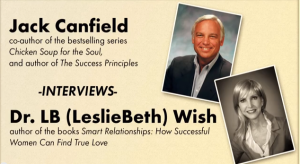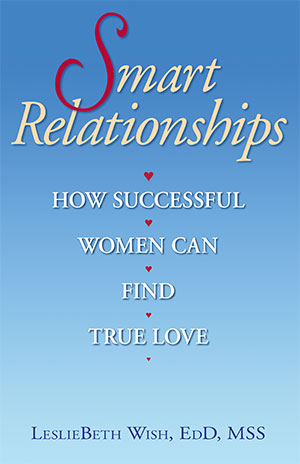Part 2 in a Series on unhealthy relationships.
 I don’t know the origin of this quote, but use it to help you develop a perspective and gauge of any unhealthy behavior of your partner:
I don’t know the origin of this quote, but use it to help you develop a perspective and gauge of any unhealthy behavior of your partner:
“One is a chance, two is a coincidence, and three is a pattern or habit.”
In my research of over 1,200 women about women in love for my self-help book, “Smart Relationships: How Successful Women Can Find True Love,” I realized quickly that too often women do not know how to assess their man’s in-sensitivities. The women struggled with questions such as: Is this a deal breaker? Do we need counseling? Am I being too critical or judgmental?
I can’t possibly give you an answer for your situation. As I’ve mentioned in other blogs, life always deals you a wild card that defies the more likely advice. Yet, I can still give you an overall guide.
Read each story based on women from my study. Each story is a composite of many similar stories. Of course, all identifying information has been dramatically changed, and any similarities are purely coincidental.
A. How to deal with your partner’s “once is a chance” insensitive behavior.
Fred didn’t know how to break the news to Rachelle. He felt like such a jerk. But it had to be done. It was his first blunder in the six months that they had been dating. He decided to break the bad news to her over dinner in their favorite little local restaurant.
“I scheduled my tennis trip with the guys over your birthday,” he said. “I’m so sorry. I was work on the speaker phone with them, and I didn’t have your birthday written into my work calendar.”
Rachelle felt her stomach lurch. “But you knew my birthday was in March.”
“Of course, I did,” he said. “I just…” he paused. “…I just didn’t have the exact date jump out at me. Can we celebrate it before or after I go away?”
Now Rachelle paused. Her relationship was going so well with Fred. They were on the same page with personal goals and values. They never even had a fight. They each said “I love you.” She thought some more, and she decided this incident was just an oversight. “It’s disappointing,” she said, “but I understand.”
Fred felt relieved. He loved Rachelle. “I’ll put your birthday in every calendar I have.” And they chose a day for her birthday celebration.
Learn from Rachelle:
1. Assess your partner’s previous behaviors. Have they been loving actions?
2. Is this the only insensitive incident?
3. Did your partner apologize and take responsibility?
4. Did the two of you develop a remedy?
B. How to deal with your partner’s “twice is a coincidence” insensitive behavior.
It happened again, Lorraine thought. After ten months of living together she was getting tired of Jack tuning out on their “at home date night.” She always cooked him his favorite meal and found a movie or television show to watch. They were both busy professionals who brought home their work. They were each homebodies and loved just relaxing and hanging out together. A date night at home seemed a perfect way to spend a weekend night.
They loved thrillers an mysteries, and Lorraine searched all the channels for the perfect movie or show. Yet, as soon as her selection came on the television, Jack kept on the lamp and read a magazine while watching the show. Lorraine felt cheated of truly watching the show as a couple. “I felt like an afterthought or an intrusion,” she said. “I wanted him fully there with me—not someone to placate.” She wondered if this pattern was going to be with them forever.
But she did nothing. She said to herself: “I can live with it. I’m being picky.”
Yet, week after week, she warehoused her feelings. Was this a sign of more disappointment in her man? Was she part of the problem? And then, one night, when she found a movie she really wanted to see, she said to Jack: “I love you and being with you. But I feel second choice. You’ve never been unkind to me before. But could you turn off the lamp and really get into the movie with me?”
Jack said, “I didn’t know it bothered you. I wish you had said something before. I just have so much to catch up on.” He put down his magazine, turned off the lamp, and never repeated his previous behavior.
Learn from Lorraine:
Lorraine did all the things that Rachelle did in the first incident, as well as these smart actions:
1. She explored whether she was allowing the problem to fester.
2. She stopped warehousing or doubting her unpleasant feelings, and she spoke up.
3. She listened to her partner’s explanation, weighed it for its reasonableness and genuine care, and she realized that he meant no malice.
C. How to deal with your partner’s “three is a pattern or habit” insensitive behavior.
This time, when Susie’s shoulder hit the wall, she heard a snap. Was it a bone? She took a breath, lingered against the wall and moved away from it very slowly. Quick motions always seemed to make things worse with James. He jumped in his skin even when she was dancing around the house.
James rushed to her side. “I didn’t mean it,” he said. “I just don’t like it when you don’t talk a lot when we’re with other people. It embarrasses me—especially when we’re dining with big investors in my business.”
Susie didn’t turn around to face him. She was afraid to make eye contact and reveal her hurt. James responded to hurt as blame. She didn’t want this incident to escalate. “I’m okay,” she said to the wall. She wanted to run out of the house, but she knew he’d follow—just as he did all the other times in their two-year marriage.
“Promise me you’ll speak up next time. These guys are heavy-hitters. I don’t want them thinking I married a dumb woman. Now come sit down and watch the game with me.”
Susie did. But in her mind, even though she was frightened of being alone again, she was planning her escape: Pack her most important documents and clothes when he wasn’t home. Make arrangements for a place to stay for the next time. Go to the women’s domestic violence agency to get help and to review her strategy and decisions. She knew she deserved happiness and kindness in a relationship.
And the next time came two weeks later. Susie enacted her plans and left him.
Learning from Susie:
Susie did all the things that Rachelle and Lorraine did, as well as these actions:
1. She stopped making excuses for James’ behavior.
2. She didn’t blame or doubt herself any longer.
3. She believed she deserved a healthy relationship.
4. She overrode her fears of being alone.
5. She sought professional advice before making any hasty decisions.
I hope this information is helpful. Please sign up to receive my blogs, and tell me about your situation, and I might be able to address it in another blog. If you are disappointed in your love life, please take a look at my two research-based, self-help books on Amazon. In the search bar, type: LeslieBeth Wish, and my two books, “Smart Relationships” and “The Love Adventures of Almost Smart Cookie” will appear. You can also follow me on Twitter @LeslieBeth Wish.







